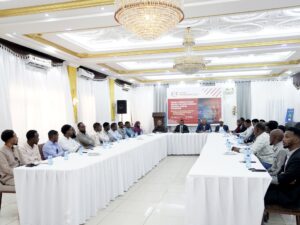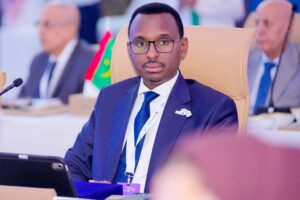Mogadishu, September 22, 2025: The Office of the Auditor General of the Federal Republic of Somalia (OAGS) hosted a high-level national sensitization seminar on audit laws and public financial management today. The one-day event brought together over 60 participants, including senior officials from federal government institutions, representatives from civil society, and the leadership of OAGS, including the Auditor General, Deputy Auditor General, and departmental directors. Held in Mogadishu, the seminar reflects OAGS’s continued efforts to promote a shared understanding of audit processes and strengthen the implementation of audit recommendations across the public sector.
The seminar was organized in response to requests made by several audited institutions following the release of the 2024 Compliance Audit Reports. These institutions called for a formal platform where they could engage with OAGS directly to better understand the audit process, legal obligations, and their responsibilities in addressing audit findings. The event responded to that need by creating an open, practical space for knowledge-sharing, questions, and collaboration.
In his opening address, Auditor General H.E. Ahmed Isse Gutale emphasized that compliance with public financial management laws is not optional but a legal and ethical obligation. He noted that strong institutions must embrace audit as a tool for learning, self-correction, and performance improvement. He called on all government agencies to take ownership of their responsibilities under Law No. 14 of 2023 and other financial legislation, and to actively implement audit recommendations as part of their governance and risk management functions.
A key focus of the seminar was the importance of internal audit units within government institutions. Presenters emphasized that internal audit is not merely a procedural formality, but a critical component of internal control. Institutions with effective internal audit functions are more likely to detect issues early, take timely corrective actions, and maintain strong collaboration with external auditors. Internal audit was framed as a practical mechanism for identifying financial risks, improving compliance, and reducing the recurrence of audit findings over time.
Throughout the day, OAGS directors and subject-matter experts delivered presentations on the audit framework, key legal instruments, and examples of common audit findings from recent compliance reviews. Each session was followed by an in-depth discussion, where participants raised questions, shared challenges, and offered practical insights into their own institutional experiences. The interactive format enabled a direct exchange between OAGS and stakeholders, enhancing mutual understanding and encouraging accountability-based dialogue.
Representatives from key segments of Somali civil society also attended the seminar, including a religious leader, the Chairperson of the Somali Civil Society Organizations (CSOs) Network, a delegate from the Association of Somali Universities (ASU), and a representative of the Somali Bankers Association (SBA). Each entity was represented by one delegate. Their participation underscored the importance of inclusive dialogue in public oversight. In their interventions, they expressed support for OAGS’s engagement approach. They emphasized that accountability and the protection of public resources are shared responsibilities that necessitate collaboration between government institutions and society as a whole.
The seminar concluded with reflections on how to improve institutional responsiveness to audit recommendations and how to sustain communication between OAGS and audited entities beyond the event. OAGS confirmed that it would continue convening similar forums as part of its broader strategy to enhance audit impact and align with international public sector audit standards. A final summary of the discussions and agreed action points will be shared with participants to guide follow-up actions.
This seminar represents a concrete step toward strengthening Somalia’s accountability ecosystem. It reflects OAGS’s institutional commitment to transparency, trust-building, and effective public financial governance in line with national law and international principles.





